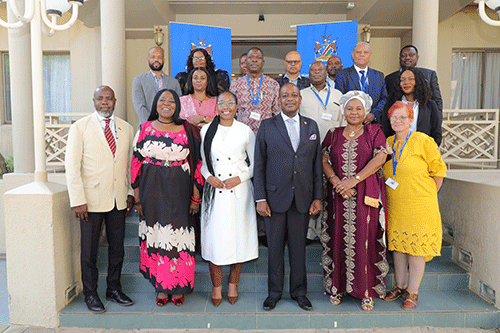Namibia is one of the nations in Southern Africa where data is significantly more expensive than elsewhere in the region and should not continue to make a fool of itself with these elevated prices.
This was the view of the information ministry’s executive director (ED) Audrin Mathe yesterday during the opening of the seventh national information and communication technology (ICT) summit.
The Communications Regulatory Authority of Namibia (CRAN) found that the cost of data and other telecommunications services in Namibia remains high due to factors such as a refusal by operators to share vital infrastructure.
As such, Mathe urged ICT summit delegates to figure out ways how to make data more affordable through discussions here.
The objective of the three-day event, which kicked off yesterday, is to provide the ICT industry an avenue to discuss current trends and issues they are facing, both locally and globally.
The annual summit aims to convene industry leaders, government officials, specialists and innovators to discuss cybersecurity issues and opportunities, exchange knowledge, and set Namibia on a path to a secure and successful digital future.
Mathe said Namibia cannot talk about a digital government if there is no connection, and if the infrastructure is not laid out.
“We must adopt a private sector attitude to achieving public sector goals. We need to work with the public and private sectors to ensure our country is sufficiently connected. We must also ensure there is availability of infrastructure throughout the country,” the ED advised.
Furthermore, government will gradually ensure there is infrastructure throughout the country to achieve full geographic coverage.
Cran also stated that Namibia has observed a 6% increase in population coverage for 4G services during 2023. Despite this positive trend, the Kunene region exhibited the lowest coverage at 41%, followed by Omaheke at 57%, and Kavango West at 59%. The Khomas region registered over 90% coverage.
The theme of this year’s ICT summit, which had been postponed for three years due to Covid-19, is “Reconsidering cybersecurity investment to safeguard the digital economy and its opportunities”.
Speaking recently at the 2023 Digital Government Africa Summit in Zambia, Mathe noted that Namibia recorded 2.7 million cyber-attacks in 2022 alone, which is a big number for a country with such a small population.
Officially opening the summit in the capital, ICT minister Peya Mushelenga said the theme underscores the paramount importance of cybersecurity in the digital era.
“Our ability to fully harness the benefits of the digital economy hinges on our capacity to protect it from potential cyber threats. Cyberattacks have become common. Cybercriminals grew brave, targeting banks and financial institutions, and they negatively affect economic growth,” he observed.
He added that the cost of cyber security is enormous, as it only takes one successful attack by a cybercriminal, while a team of experts is required for continuous defence of the information system against these digital attacks. This, said Mushelenga, places an enormous burden on public resources.
The politician informed delegates that to address the challenges posed by cybercrimes in the absence of cybercrime legislation, his ministry and relevant stakeholders have developed a Cybersecurity Strategy and Awareness Creation Plan.
The primary goal of this strategy is to secure national critical information infrastructure, raise awareness, and foster collaboration in the cybersecurity ecosystem to enhance the safety of internet users.
In addition, the government has prioritised the enactment of cybercrime and data protection legislation to combat cyber incidents and safeguard the personal data of its citizens.
“It is imperative to thoroughly investigate the vast array of possibilities presented by the technological domain, encompassing digital transactions, online commerce and inventive approaches that have the potential to enhance the capabilities of our country,” said the minister.
– mndjavera@nepc.com.na


